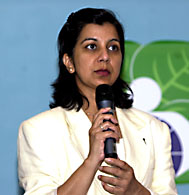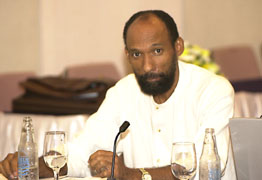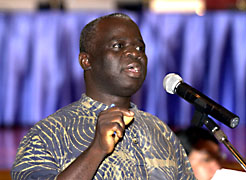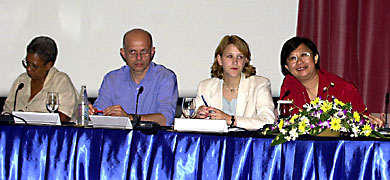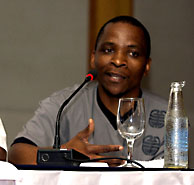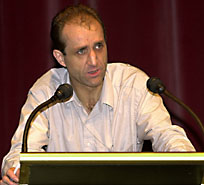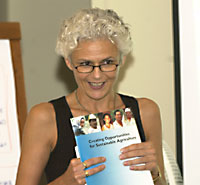|
|
|||||||||||||||||||||||||||||||||||||||||||||||||
|
|||||||||||||||||||||||||||||||||||||||||||||||||
|
Events convened on Thursday, 30 May 2002 |
Kanta Kumari, GEF, highlighted the recommendations formulated by the energy roundtable, which call for, inter alia: government establishment of targets and timetables; mechanisms to facilitate markets for clean energy; environmental and social energy sector reforms; capacity building for regulation, policy, and good business; new financial mechanisms and institutions; and strategic alliances among governments, NGOs and the private sector. The land, water and food security roundtable recommended: a shift from single-sector to integrated approaches; development and adoption of environmentally sound technologies; agricultural research; strengthened partnerships; and capacity building. The forests roundtable recommended the development of a new generation of institutions to holistically address forest issues; generation and assessment of forest-related knowledge; the development of effective and innovative financial arrangements for forest conservation; and greater private sector involvement in solutions.
 Listen
to Kumari's presentation
Listen
to Kumari's presentation
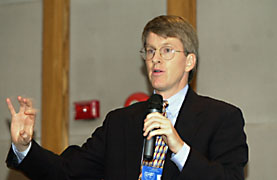 |
| John Kellenberg, RUTA, explains that an environmental services programme is a mechanism to contract landowners for the environmental services their lands produce when they adopt environmentally friendly land uses and production systems. |
 Listen
to Kellenberg's presentation
Listen
to Kellenberg's presentation
Discussion: Participants discussed several issues regarding the Costa Rica programme, including: its sustainability with regard to NGO participation; the benefits to indigenous peoples; difficulties with expanding it to other Central American countries given their different land tenure systems; alternative uses of forests; complexities in determining the economic costs of environmental services; and the sharing of benefits at the community level.
| More
information: http://www.gefweb.org http://www.ruta.org |
Contact: Hutton Archer <harcher@worldbank.org> Kanta Kumari <kkumari@worldbank.org> John Kellenberg <jkellenberg@ruta.org> |
|
|
Energy for sustainable development of SIDS Presented by the United Nations Industrial Development Organization (UNIDO)
Tuiloma Neroni Slade, Samoa, highlighted the Barbados Programme of Action as a key vehicle for regional and inter-regional cooperation, and underscored that energy efficiency has become a top priority for small island States. He emphasized the need to maximize renewable energy use and address the 70% of rural small island State communities lacking access to electricity, and highlighted the potential for inter-regional cooperation and UN system involvement in improving education and public awareness on energy issues among small island State populations. Espen Ronneberg, UNDESA, presented an overview of energy issues within the Barbados Programme of Action, and identified patterns of common interest among small island States with similar natural resources, human resources, and externalities. He presented a SIDS perspective on, inter alia: energy efficiency enhancement; regional cooperation; programme successes and failures; and the use of tariffs and customs reform to foster the use of renewable energy sources. Al Binger, University of the West Indies, addressed current energy use among small island States, and possibilities for a more sustainable paradigm of energy use. He stated that SIDS generally do not have specialized energy regimes but rely on petroleum-derived fuels and inefficient usage patterns, noting inter-linkages of these problems with social stability, agricultural productivity, and national balances of payment. Binger highlighted potential improvements in areas such as inter-sectoral coordination for the utilization of agricultural and waste byproducts, the use of electric vehicles, and further development of solar and water-based energy sources. Discussion: Participants addressed several issues, including: a national goal in St. Lucia to generate 100% of its energy from renewable sources; benefits and costs of energy privatization; the use of tariffs to support conversion to electric vehicles; financing of energy investments; energy savings from compact fluorescent lighting; and the protection of energy equipment from hurricanes.
|
|
|
Mining and sustainable development - two apparently contradictory concepts: Challenges for the WSSD Presented by Third World Network - Africa
Yin Shao Loong, Third World Network, called for discussions at ethical, political and knowledge-generating levels to address the linkages between climate change and mining. Victoria Tauli-Corpuz, Tebtebba Foundation, emphasized that, since local communities do not benefit from mining operations, they should be entitled to prevent them, and noted the success of some communities in the Philippines in exercising this right. She also criticized World Bank and export credit agency loans that support destructive mining activities. Tracy Glynn, Mining Advocacy Network, presented a case study on the adverse impacts of mining on the environment, local communities, and human rights in Indonesia. She also described her organization's advocacy against unsustainable mining, and called for a corporate accountability system in the mining sector. Clare Stark, Mineral Policy Center, presented the NGOs Global Mining Campaign, which highlights violations of human, environmental and indigenous peoples' rights by mining industries, and introduced its report entitled Digging Deep: Is Modern Mining Sustainable? Gabriel Rivas Ducca,
Friends of the Earth International, called on the WSSD to restore
sustainability and essential elements of good governance and justice in
mining. He also called for effective reduction of mining activities,
changes in the culture of consumption, an independent international
tribunal for mining-related crimes, and an end to the destructive economic
cycle of mining fuelled by financial institutions.
|
|
|
Working together on gender equity: Major groups explore mainstreaming gender in sustainable development Presented by the Women's Environment and Development Organization (WEDO)
Kristen Sukalac, International Fertilizer Industry Association (IFIA), emphasized that, from the business perspective, the major gender issue is women's access to education. She also noted that the gender issue is about both women and men. Ching Chabo, International Confederation of Free Trade Unions (ICFTU), highlighted the importance of: women's employment as the key to poverty eradication; prevention of sexual harassment; and women's involvement in community activities. Kate Hamilton, International Council for Science, noted that the promotion of gender equality in science has been identified by the scientific and technological community as a key means of improving its input in sustainable development. She said the ability of women to think across issues and link scientific research to real-life needs is crucial for advances in science for development, and emphasized the need for the prioritization of women's education, gender balance in the workplace, and research on women's issues. Giuseppe Gamba, World Association of Cities and Local Authorities Coordination (WACLAC), noted that women remain a minority in local governments, and stressed his organization's commitment to promoting women's participation in public activities and political decision-making processes, and to implementing grassroots projects and programmes to enable women's participation in the economic development of their communities. Discussion: Delegates addressed, inter alia: legal discrimination against women; the impacts of war on women; women's security; and the need to ensure equitable participation by women in the WSSD process and strengthen lobbying for the prioritization of women's issues in the WSSD agenda.
|
|
|
Implementing Principle 10: The Access Initiative Presented by the Access Initiative Core Team: Advocates Coalition for Development and Environment, Corporación PARTICIPA, Environmental Management and Law Association, Thailand Environment Institute, and the World Resources Institute (WRI)
Elena Petkova, Access Initiative, noted that access and participation underlie Principle 10 of the Rio Declaration, and explained that the Access Initiative brings together more than 30 civil society groups to strengthen capacity in tracking implementation of access and participation guidelines and in raising awareness and government commitment to Principle 10. She described how member groups have conducted national assessments to examine legal structures and the practical implementation of these commitments in their countries. Access Initiative coalition members from ten organizations in nine countries presented accounts illustrating successes and failures in information access, participation and justice. These case studies addressed, inter alia: a new national transparency and information access law in Mexico; failure to disclose fire safety data in India; the collection of air quality monitoring data in Chile; lapses in small-scale industry data collection in Thailand; the Electronic Freedom of Information Act Amendments in the US; conflicting sector- and national-level disclosure laws in Indonesia; the establishment of NGOs' right to sue and exemption from fees in Hungary; and participatory establishment of national forestry policy in Uganda. Discussion: The ensuing discussion addressed, inter alia: the importance of regional perspectives in evaluating participation and access; the role of the media in building public awareness; existing national indicators and statistics; public capacity in taking advantage of access rights; collaboration with parliamentarians; communities' roles in collecting as well as accessing information; linkages with good governance; and transparency in negotiations outside the environmental arena.
|
|
|
WSSD partnerships for implementation (Type II outcomes): Monitoring, institutional and process issues Presented by the Royal Institute of International Affairs (RIIA)
Dave Moorcroft, BP, stressed the need to develop a shared understanding of the purpose and added value of partnerships, and to focus on outcomes rather than outputs, on impact rather than process, and on performance. Bongiwe Njobe, South Africa, said the greatest risk with voluntary partnerships stems from the difficulty of measuring their impacts on intended objectives, and stressed the need for clarity on guidelines, parameters, instruments of measurement, and intended beneficiaries. She said complementarity of Type II outcomes is crucial, and noted that their value will only be realized when Type I outcomes are solidified. Jonathan Margolis, US, emphasized that proposed partnerships must be credible and well-developed, yet not so prescriptive that they are inflexible. He noted the absence of formal discussions on partnerships at PrepCom IV thus far, and suggested that the UN devote resources to facilitating some. He stated that major groups, as well as governments and the UN, must adapt and develop new skills to form partnerships and implement their objectives. Katherine Short, WWF, welcomed the opportunity of the WSSD to announce partnerships, but stressed that partnerships cannot be a substitute for action by governments. She stated that civil society will support the evolution of partnerships when certain core conditions that enable them to work are established. Nitin Desai, WSSD Secretary-General, explained that part of the Secretariat's motivation in promoting partnerships is the political necessity of expanding the range of civil society organizations involved in UN activities beyond advocacy groups to those implementing projects on the ground, in order to better enable the UN to operationalize the multitude of multilateral environmental agreements. Adnan Amin, UNEP, recognized that international institutions must adapt to the new era of multilateralism and that partnerships are key in this respect, but stressed the importance of defining their parameters, specificity of activities, and legitimacy and monitoring mechanisms. Jan Kára, Czech Republic, highlighted the multiplicity of different visions for partnerships, noting considerable mistrust and uncertainty. He emphasized the promotion of education and training in sustainable development and development cooperation, and the importance of embracing people from developing countries in this framework.
|
|
|
Promoting Capacity Building for Sustainable Agriculture Presented by the Asia-Pacific Regional Technology Center (APRTC), CropLife International and the Stakeholder Forum for Our Common Future
At present, the main partners are CropLife International, WorldView
International Foundation and APRTC, but other partners are being
solicited. The partnership seeks to expand access to computers and
connectivity, translation, and facilitate the identification and
development of training modules, with the eventual goal of enabling the
direct exchange of experiences between farmers.
|
|
|
|
|
|
|
|
The Earth Negotiations Bulletin (ENB) on the side is a special publication of the International Institute for Sustainable Development (IISD) in cooperation with the United Nations Development Programme (UNDP). The Editor of ENB on the side is Kira Schmidt kira@iisd.org.This issue has been written by Tamilla Held tamilla@iisd.org, Jenny Mandel jenny@iisd.org and Kira Schmidt kira@iisd.org. The Digital Editors are Andrei Henry andrei@iisd.org, Leila Mead leila@iisd.org, and Diego Noguera diego@iisd.org. Funding for publication of ENB on the Side at PC-IV is provided by UNDP. The opinions expressed in ENB on the Side are those of the authors and do not necessarily reflect the views of IISD and funders. Excerpts from ENB on the Side may be used in non-commercial publications only and only with appropriate academic citation. For permission to use this material in commercial publications, contact the Managing Editor at kimo@iisd.org. Electronic versions of issues of ENB on the Side from WSSD PC-IV can be found on the Linkages website at http://enb.iisd.org/2002/pc4/enbots/. |
|
|
| © 2002, IISD. All rights reserved. |
|





